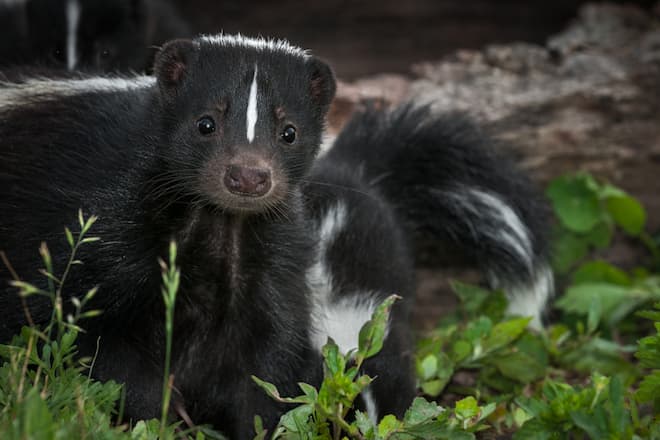Skunks can live just a few weeks with rabies after the virus has reached the nervous system. Rabies can be an incredibly invasive disease that can send the raccoon into a delirious state where the raccoon can seem confused and be overly aggressive for no reason. Raccoons are already destructive by nature and the rabies virus can aggravate the situation.
Wandering aimlessly
One indication of a rabid skunk is if it appears confused or lost. Skunks are generally active during the night. If you observe a skunk remaining motionless for an extended period or moving slowly, it is advisable to contact a skunk removal expert to avoid any potential danger.
Foaming from the mouth
If you spot a skunk foaming at the mouth or drooling excessively, it may look unpleasant and even frightening. However, this is a sign that the skunk is likely in the later stages of rabies. Rabies affects the nervous system, causing numbness in facial muscles and other functions. It’s essential to act quickly and call in a skunk removal professional like Skunk Control to ensure safe and efficient removal.
Aggressiveness
When skunks are rabid, they can be extremely aggressive and may seek out confrontation at any time. It is crucial to stay at a safe distance from them and keep children and pets indoors, as skunks may attack them. Skunks may make loud noises such as screeching, grumbling, and hissing to show their dominance. It is best to avoid getting too close to them and instead contact an animal control professional for assistance.
Abnormally Tame
Skunks are very shy animals and do not want to get anywhere near people. So, when you do see a skunk that is acting very friendly, then something is wrong. Do not pet it, nor feed it. This can also be a very clear sign of rabies. Even though, this looks positive, its behaviour can rapidly change in a whim.
Here are some signs to watch for if you notice a skunk behaving strangely. It can be difficult to determine if your animal has been bitten, as they often interact with other animals. However, if your pet exhibits unusual aggression, shyness, changes in vocalization, excessive drooling, stumbling or falling, paralysis, or other concerning symptoms, it’s important to contact a veterinarian immediately, even if you’re unsure.
To get rid of rabid skunks on or near your property, call for more direct contact to help you immediately.

